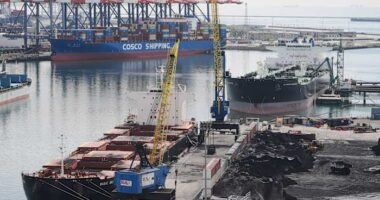Share this @internewscast.com
The chair of the National Transportation Safety Board has attributed systemic failures to an incident involving a door plug blowout over Portland, Oregon, in January 2024.
Alaska Airlines Flight 1282 was forced to make an emergency landing just 30 minutes following its departure from Portland International Airport when the door plug detached from the plane at an altitude of 14,830 feet. This resulted in a breach on the aircraft’s side, which caused oxygen masks to deploy amid a sudden loss of cabin pressure and led to objects being drawn out due to the high winds and loud noise experienced by those on board.
All passengers survived, but several suffered minor injuries.
After a 17-month investigation, the NTSB concluded that four bolts, crucial for securing the door plug, were removed during repair and were never reattached.
Investigators determined the door plug had also gradually moved during the 154 flights prior to this incident, before it ultimately flew off.
“The safety deficiencies that led to this accident should have been evident to Boeing and to the FAA,” NTSB Chair Jennifer Homendy said. “This time it was missing bolts securing the door plug, but the same safety deficiencies that led to this accident could just have easily led to other manufacturing quality escapes and other accidents.”
Boeing factory workers told NTSB investigators they felt pressured to work too fast and were asked to perform jobs they weren’t qualified for. None of the 24 people on the door team were ever trained to remove a door plug before working on the plane in question, and only one of them had ever done so before. That person was on vacation when the repair was being done.
The NTSB says Boeing and the Federal Aviation Administration have improved training and processes since the blowout.
Boeing and Spirit AeroSystems — the company that made and installed the door plug — are redesigning them with another backup system to keep the panels in place even if the bolts are missing, but that improvement isn’t likely to be certified by the FAA until 2026 at the soonest. The NTSB urged the companies and the regulator to make sure every 737 Max is retrofitted with those new panels.
In a statement, Boeing said that they “regret this accident and continue to work on strengthening safety and quality across our operations.”
“We will review the final report and recommendations as we continue to implement improvements.”
The Associated Press contributed to this story.









